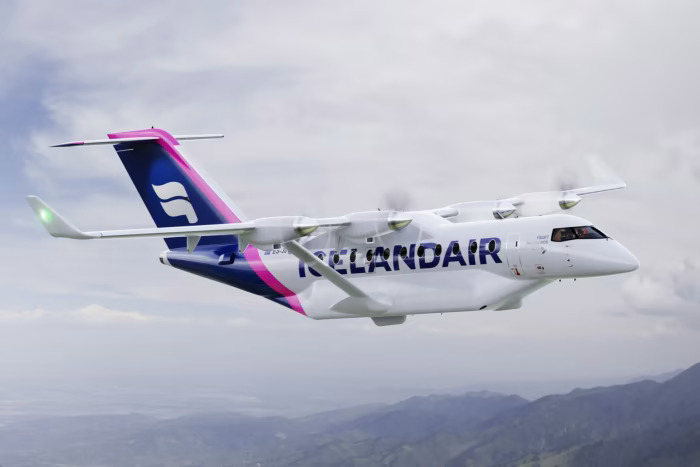REYKJAVIK, ICELAND — Icelandic flag carrier Icelandair is aiming to become the first national airline to operate all its domestic routes with electric aircraft over the next decade, chief executive Bogi Nils says.
The airline plans to exploit its homeland’s abundant cheap, carbon-free electricity to fuel the aircraft, either by powering batteries or generating hydrogen for use in fuel cells, according to Bogi Nils Bogason.
“We’re focusing on having our domestic operation carbon-free by the end of this decade,” Bogason said. The airline operates three domestic routes from its home base at Reykjavík airport just outside the center of the capital— to Egilsstadir, Akureyri, and Ísafjördur. The longest flight to Egilsstadir takes an hour.
“We firmly believe it’s realistic that we will be operating a carbon-emission-free aircraft in our domestic operations before the end of this decade,” Bogason said during a visit to London. “Our plans are for that, whether it will be hydrogen-powered or a partly electric-powered aircraft.”
Although Norway’s Widerøe airlines last year announced plans for passenger operations with an electric aircraft, Icelandair’s plans are more ambitious.
The Norwegian airline plans to use its aircraft, to be developed by Brazil’s Embraer and the UK’s Rolls-Royce, only on flights of up to 30 minutes. Its planned nine-seat aircraft is significantly smaller than the 30 to 40-seat aircraft that Icelandair plans to deploy. United Airlines, Air Canada, and Connect Airlines, a Massachusetts-based start-up, have all announced plans to operate some regional flights in North America with electric or hydrogen-powered aircraft. However, Icelandair is the first of the traditional national airlines to target entirely carbon-free domestic flights.
“We believe it’s realistic that this will happen within a few years, and we’ll be the first airline, or the first country, to have carbon-free domestic aviation,” Bogason said.
Air operations have been especially difficult to decarbonize because electric or hydrogen power plants offer far less power for a given weight than established jet and turboprop technologies. Iceland enjoys ready access to carbon-free electricity thanks to power generated from the volcanically-active country’s abundant geothermal energy. Icelandair has struck agreements with two providers of the current experimental aircraft systems. In September, it signed a letter of intent with Sweden’s Heart Aerospace about potentially purchasing the manufacturer’s 30-seat ES-30 aircraft, a regional aircraft powered by batteries and with a conventional backup engine.
In July last year, it signed a similar letter with the US’s Universal Hydrogen. The company, which is mainly focused on providing hydrogen fuel systems to airlines, has undertaken to convert Icelandair’s existing 37-seat Dash-8 turboprops to hydrogen power. Universal Hydrogen said that using its system, it hoped to help Icelandair decarbonize its domestic route network starting as early as 2026.
“Iceland is in a unique position, given their abundant supply of renewable energy with which to produce green hydrogen to complete this transformation ahead of others,” it said.
Heart Aerospace confirmed it had been in discussions with Icelandair for some years and said the collaboration had reached a “different level of detail” after signing the letter of intent. Andrew Charlton, a Geneva-based aviation consultant, said it would be a huge boost for zero-carbon aviation if Icelandair managed to introduce the technology and would show the way forward. Charlton said some other countries had similarly abundant clean electricity, although most generated it through solar power.
“There are other places with similar benefits, so it would be a great first step,” he said.
Via FT

